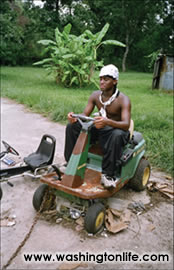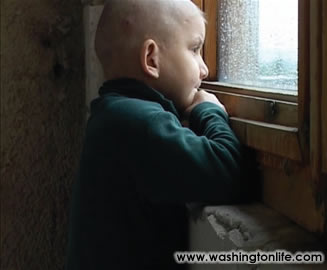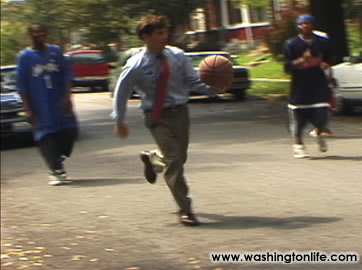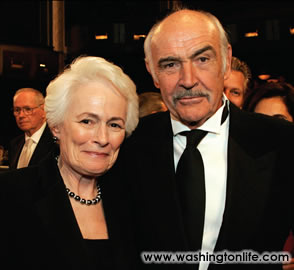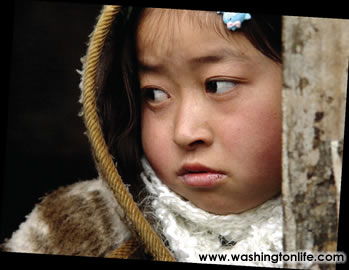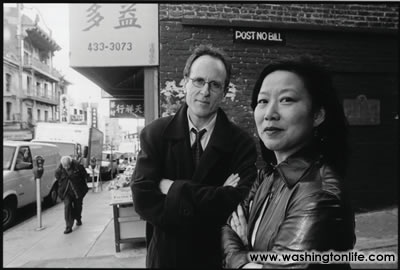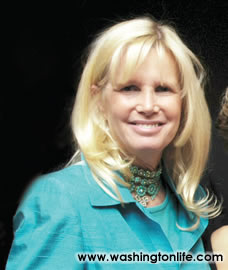|
SILVERDOCS
FESITIVAL WINNERS
JESUS CAMP Winner: Sterling Feature Jury Award Directors Heidi Ewing and Rachel Grady present a probing documentary about the youth of the Christian evangelical movement, immersed from birth in their parents' fervent fundamentalist beliefs. The fi lm reveals the pervasiveness of this "fringe" religious culture in our society CHAIRMAN GEORGE Winner: Special Feature Jury mention Chaiman George follows George Sapoudinis, a Greek-Canadian statistician, to Beijing before the Olympics, where he intends to fulfi ll his passion for singing in Mandarin. Directors Daniel Cross and Mila Aung-Thwin present this fairytale-like story as a bridge between two very different cultures.
SEEDS Winner: Sterling Short Jury Award A Siberian family struggles through their heartaches with their patient and wise father's support. Directed by Wojciech Kasperski.
MCLAREN'S NEGATIVES Honorable Mention, Sterling Short Award Director Marie-Josee Saint-Pierre utilizes Canadian animator Norman McLaren's creative techniques in this unusual, personal documentary.
THE ALUMINUM FOWL Honorable Mention, Sterling Short Award Director James Clauer presents a disturbing yet beautiful portrait of four brothers with too much time on their hands on a chicken farm in rural Louisiana.
A GIRL LIKE ME Winner: Short Audience Award Special Short Jury mention A young black woman examines her peers' attitudes on blackness. Directed by Kiri Davis.
ROLLING LIKE A STONE Winner: Music Documentary Award This thoughtful documentary from Sweden revisits an episode from the youth of the Rolling Stones and examines its repercussions on those who experienced it.
THE BLOOD OF YINGZHOU DISTRICT Winner: DOCS Rx Global Documentary Award Director Ruby Yang follows young Gao Jun, abandoned because of the contamination of Chinese blood banks with HIV/AIDS, as he strives to fi nd a home and become accepted in the rural district of Yingzhou. The boy's long silence in the fi lm offers a touching symbol of the voiceless victims of the disease.
BEFORE FLYING BACK TO EARTH Special DOCS Rx Jury mention Arunas Matelis' fi lm is a poetic glimpse into the lives of children living with leukemia at a pediatric hospital in Lithuania. Despite the mundane daily routine of the hospital, the fi lm captures the hope and innocence of the children in the clinic.
CAN MR. SMITH GET TO WASHINGTON ANYMORE? Winner: SILVERDOCS Audience Award Feature Director Frank Popper follows the upstart campaign of political newcomer Jeff Smith in Missouri.
THE SHERIFF OF GAY WASHINGTON Winner: Short Audience Award Sargeant Brett Parson battles stereotypes while commanding the Washington Metropolitan Police Department's Gay and Lesbian Liaison Unit, dedicated to solving crimes by and against the gay community, directed by John W. Poole. COUGARS ON THE EDGE Winner: Animal Content in Entertainment (ACE) Grant Director Janice Jensen explores the habitat encroachment on the cougar in the Santa Monica Mountains.
AFI: 2006 Life Achievement Award Unlike at the Academy Awards, where, if you're not nominated you're largely ignored, the parties leading up to and following the AFI Life Achievement Awards are much more celebratory and light-hearted. On the evening prior to the black-tie gala there's a small private reception where the honoree is entirely accessible. Sean Connery, a powerful presence at this year's party at Morton's in Beverly Hills, was happy to pose for photographs and mingle with the guests. On the other side of the room, his petite French wife, Micheline, was like an exotic bird and had gathered her own group around her. The party following the gala took place at the Highlands night club, in the Kodak Theater complex, and was attended by Connery and his family, George Lucas, Harrison Ford (with Calista Flockhart), Tom Jones, and many others from the entertainment industry who came to pay tribute to the 2006 honoree. In the end it was Tippie Hedren, who co-starred with Connery in Alfred Hitchcock's "Marnie," who really stood out among the highpowered Hollywood crowd that evening. Dressed in a long white gown covered entirely by tiny white pearls, she spoke to the gathering about Connery's famous sex-appeal. Hitchcock had groomed the delicate beauty to replace Grace Kelly as his leading lady after Kelly had left Hollywood for Ranier and Monaco. Hedren seemed untouched by time. Hitch had chosen well.
THE BLOOD OF
YINGZHOU DISTRICT
SILVERDOCS DOCS The fourteen-hour train ride from Beijing to the villages of Anhui, in rural China, is a journey back in time: fi elds fallow in the winter cold, earthen gravesites visible through the stubble, fi shermen at the riverbanks. If you turn away from the telephone poles, you could imagine yourself a century back - a time when disease had the power to strike uncomprehending terror into farming families' lives. This is where three Huang children, orphaned by AIDS, led fi lmmaker Ruby Yang to their family home where they found empty medicine bottles, old toys, children's scribbles on the wall, and the smell of death. Neighbors and classmates, scared of infection, shunned them. Here a fi lmmaker could lend a hand - dispel some of the unneeded fears, ease the stigma. With the help of collaborator/producer Thomas Lennon, that's exactly what Yang did. Washington Life: Did you plan to make this
particular fi lm - or did it just happen? WL: How did this challenge differ from your
previous fi lms?
WL: How much power do documentary fi lms
have to raise awareness of health issues?
WL: How did the making of this fi lm affect
you personally? WL: What will be the fate of the children in
the fi lm?
WL: What was the fi lm's biggest challenge?
WL: Was it hard to separate making this fi lm
with "wanting to help?"
A PRESCRIPTION The power of cinema can educate and activate people to respond to health problems we face in the United States and around the world. The SILVERDOCS DOCS Rx program did just that by shining a spotlight on signifi cant global health concerns and serving as a catalyst for public discussion and social change. By bringing together inspiring and thought-provoking documentary movies from around the world, SILVERDOCS DOCS Rx exposed audiences to international health problems as different as water contamination in Bangladesh and India, Alzheimer's disease in Canada, childhood leukemia in Lithuania, tuberculosis in Afghanistan, paraplegia in Chile, HIV/AIDS in China, and breast cancer and multiple sclerosis in the United States. National health experts, many from Washington, D.C. area organizations including the National Institutes of Health, the National Rehabilitation Hospital, the Global Health Council, George Washington University, and the Children's National Medical Center, served as panelists to explore the issues raised by the documentaries and challenged audiences to take action. The fi lms illuminated that nations today face a double jeopardy from both infectious and chronic diseases which have tremendous humanitarian, economic, and national security implications. Annually, one in four deaths worldwide are due to infectious illnesses: three million people die of AIDS, two million from tuberculosis, and one million each die of malaria and measles. Furthermore, since 1972, more than 32 new illnesses such as AIDS, Lyme's disease, SARS, West Nile virus, and H5N1 avian influenza have appeared. A staggering one billion people do not have access to safe drinking water. In an interconnected global society - 2 million people cross national borders every day - the spread of an infectious illness like avian fl u, the safety of our food and water supply, the impact of tobacco and obesity-related diseases, and the threat of bioterrorism do not respect national boundaries. The good news is that solutions cross national borders, too. Prevention and public health preparedness are cornerstones to improving global health and decreasing health care costs. For example, simple, affordable interventions - vaccines, antibiotics, vitamins, safe birthing kits, rehydration solutions, and mosquito bed nets - are available to prevent over 80 percent of the 10 million children's deaths that occur annually worldwide if we committed the political will and resources to deliver them. The SILVERDOCS DOCS Rx program served as a call to action to improve global health. We are the fi rst generation that has the scientifi c, technological, and public health advances to look health disparities and preventable diseases in the eye and put an end to needless suffering worldwide. It's the moonshot of our time.
|
||||||||||||||||||||||||||||||||||||




